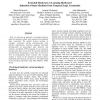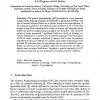139 search results - page 9 / 28 » Specialization of Inductively Sequential Functional Logic Pr... |
EH
1999
IEEE
1999
IEEE
Evolvable Hardware or Learning Hardware? Induction of State Machines from Temporal Logic Constraints
14 years 5 days ago
Here we advocate an approach to learning hardware based on induction of finite state machines from temporal logic constraints. The method involves training on examples, constraint...
ARC
2009
Springer
14 years 2 months ago
2009
Springer
The parallel branching program machine (PBM128) consists of 128 branching program machines (BMs) and a programmable interconnection. To represent logic functions on BMs, we use qua...
JLP
2007
13 years 7 months ago
2007
Several induction theorem provers were developed to verify functional programs mechanically. Unfortunately, automatic verification often fails for functions with accumulating arg...
EVOW
1994
Springer
13 years 12 months ago
1994
Springer
The genetic programming (GP) paradigm is a new approach to inductively forming programs that describe a particular problem. The use of natural selection based on a fitness ]unction...
POPL
2008
ACM
14 years 8 months ago
2008
ACM
We propose a novel approach to proving the termination of heapmanipulating programs, which combines separation logic with cyclic proof within a Hoare-style proof system. Judgement...


